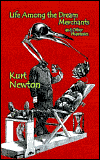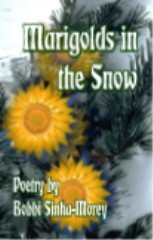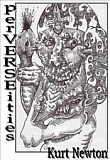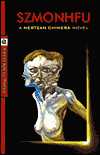
Petting the Time Shark, by Mike Allen
Book Review by Daniel E. Blackston
Have you read this book?
Petting the Time Shark is a SF poetry chapbook by Mike Allen, published in 2003 by DNA Publications. The collection sidesteps a rigorous allegiance to its surrealistic cover-image, instead, delving into various themes and styles. A welcome lack of artifice or superfluous ornamentation weds each of the poems to a collective whole, though there are a wide range of stanza forms and lingual palettes on display.
Track One, the title poem, distinguishes itself by being precisely what one wouldn't expect from a poem entitled "Petting the Time Shark." In fact, there is no actual shark, no melting watches, no real hint at all of quantum matrixes or Dali-esque seascapes. Instead, the poem could almost stand as a Stoic lyric:
Stroke, always forward, never back,
never force your hand into the past,
lest it split, fragment, lay raw nerves
open to history.
The title poem also brings into focus the most frequent criticism that this collection incites: that of lack of closure. The lines quoted above are the closing lines of the poem, and yet they do not produce any real sense of finality; rather, the entire lyric seems poised to launch a longer, perhaps more philosophically dense, poem. However, the fragment form does harmonize well here with the poem's theme of time-flux. In other poems: "Ogren Crossing," "Dreamshore," "Plague," "A Million Layers Removed," the fragment form is much less effective. It should be noted, however, that the tendency to write in fragments is no special preoccupation of Mr. Allen; rather, it is a modern absorption rampant throughout the pages of most literary journals and need not be an incriminating factor. On the other hand, Allen's success in creating total poems is quite evident in other works in the collection, so some of the less complete pieces seem to really stand out, whether for better or worse, depending on one's subjective predilections, by contrast.
Allen's range is impressive: the grief-study, "Funeral Pie" in addition to the clever wordplay in the title (read: "Funeral Pyre"), is a poem that seems devoid of overt speculative content; nonetheless, it is a compelling poem -- and one that I feel would have benefitted greatly from the pruning of it's closing line: "Bake until warm" which seems to miss ironic tragedy and find, instead, an unintended humor.
"The Unseelie Tree," a longer piece, unfolds with great aplomb, taking as its cue the Encyclopedia Mythica's reference to "The Unseelie Court," which consists of "those fairy-like beings which are the most ugly and evil." A fine sense of diction propels this brooding lyric through wonderful lines such as:
I see tumult in their midst, a howling
captive; the careening Horde suppresses
his struggles. Below, the Tree unfurls
its branches, gapes its bark, opens a ragged
round maw. The captive's screams drown
out the giggles as they lower him in,
as the limbs bend inward like a sundew's,
an anemone's.
"Seventh Coming" co-written with Ian Watson is a spectacular achievement of irony in a SF-nal idiom, with various Jesus models: 5.7, 6.6, 7.0 -- recounted through an apocalyptic narrative. This poem establishes an admirable and very difficultly obtained balance between classical and SF diction, with such blank-verse lines as: "but the brutes' penchant for bloodlust ran" riding right along with lines like: "for the first/time in eons, hawk factions outvoted the doves" or "The board met in their pocket universe/to discuss the design of Jesus 7.0." A finely imagined and deftly executed poem.
"Waiting for the Tow" takes up the paradigm of the poet as a stranded space-traveler, fed on ennui and solitude -- an apt and cleverly scribed lyric, which flirts finely with confessional modes. This poem, like "Seventh Coming" hints, however slightly, at the collection's socio-political themes, which find grand expression in pieces like "Metarebellion" and "guerrillavid inc." among others. "Metarebellion" recalls Sylvia Plath's "Lorelei" poem in the sense that invisible but irresistible voices permeate our worlds and entice us to Question Authority. Plath ironically asserts:
"[...]Sisters, your song
Bears a burden too weighty
For the whorled ear's listening
Here, in a well-steered country,
Under a balanced ruler.
Deranging by harmony
Beyond a mundane order,"
Allen's space-rebels endure as strange, galactic Lorelei: "some scattered into quantum futures, some/flashed away in ships of light" and "Invisible, our rebellion still spreads, planted/ in a billion mindmasses" -- and their message is: "Do not accept,/ we whisper down the soul-webs. Do not believe."
Allen displays enough range and gusto to please any reader; the weaker poems, as I've mentioned, are weak merely because of their fragment-like appearances, but nothing in this chapbook is unworthy of your attention. At a cover price of $5.00 this collection is a steal. I strongly encourage you to pick up a copy of Mike Allen's spirited and smoothly imagined Petting the Time Shark from DNA Publications.
Track One, the title poem, distinguishes itself by being precisely what one wouldn't expect from a poem entitled "Petting the Time Shark." In fact, there is no actual shark, no melting watches, no real hint at all of quantum matrixes or Dali-esque seascapes. Instead, the poem could almost stand as a Stoic lyric:
Stroke, always forward, never back,
never force your hand into the past,
lest it split, fragment, lay raw nerves
open to history.
The title poem also brings into focus the most frequent criticism that this collection incites: that of lack of closure. The lines quoted above are the closing lines of the poem, and yet they do not produce any real sense of finality; rather, the entire lyric seems poised to launch a longer, perhaps more philosophically dense, poem. However, the fragment form does harmonize well here with the poem's theme of time-flux. In other poems: "Ogren Crossing," "Dreamshore," "Plague," "A Million Layers Removed," the fragment form is much less effective. It should be noted, however, that the tendency to write in fragments is no special preoccupation of Mr. Allen; rather, it is a modern absorption rampant throughout the pages of most literary journals and need not be an incriminating factor. On the other hand, Allen's success in creating total poems is quite evident in other works in the collection, so some of the less complete pieces seem to really stand out, whether for better or worse, depending on one's subjective predilections, by contrast.
Allen's range is impressive: the grief-study, "Funeral Pie" in addition to the clever wordplay in the title (read: "Funeral Pyre"), is a poem that seems devoid of overt speculative content; nonetheless, it is a compelling poem -- and one that I feel would have benefitted greatly from the pruning of it's closing line: "Bake until warm" which seems to miss ironic tragedy and find, instead, an unintended humor.
"The Unseelie Tree," a longer piece, unfolds with great aplomb, taking as its cue the Encyclopedia Mythica's reference to "The Unseelie Court," which consists of "those fairy-like beings which are the most ugly and evil." A fine sense of diction propels this brooding lyric through wonderful lines such as:
I see tumult in their midst, a howling
captive; the careening Horde suppresses
his struggles. Below, the Tree unfurls
its branches, gapes its bark, opens a ragged
round maw. The captive's screams drown
out the giggles as they lower him in,
as the limbs bend inward like a sundew's,
an anemone's.
"Seventh Coming" co-written with Ian Watson is a spectacular achievement of irony in a SF-nal idiom, with various Jesus models: 5.7, 6.6, 7.0 -- recounted through an apocalyptic narrative. This poem establishes an admirable and very difficultly obtained balance between classical and SF diction, with such blank-verse lines as: "but the brutes' penchant for bloodlust ran" riding right along with lines like: "for the first/time in eons, hawk factions outvoted the doves" or "The board met in their pocket universe/to discuss the design of Jesus 7.0." A finely imagined and deftly executed poem.
"Waiting for the Tow" takes up the paradigm of the poet as a stranded space-traveler, fed on ennui and solitude -- an apt and cleverly scribed lyric, which flirts finely with confessional modes. This poem, like "Seventh Coming" hints, however slightly, at the collection's socio-political themes, which find grand expression in pieces like "Metarebellion" and "guerrillavid inc." among others. "Metarebellion" recalls Sylvia Plath's "Lorelei" poem in the sense that invisible but irresistible voices permeate our worlds and entice us to Question Authority. Plath ironically asserts:
"[...]Sisters, your song
Bears a burden too weighty
For the whorled ear's listening
Here, in a well-steered country,
Under a balanced ruler.
Deranging by harmony
Beyond a mundane order,"
Allen's space-rebels endure as strange, galactic Lorelei: "some scattered into quantum futures, some/flashed away in ships of light" and "Invisible, our rebellion still spreads, planted/ in a billion mindmasses" -- and their message is: "Do not accept,/ we whisper down the soul-webs. Do not believe."
Allen displays enough range and gusto to please any reader; the weaker poems, as I've mentioned, are weak merely because of their fragment-like appearances, but nothing in this chapbook is unworthy of your attention. At a cover price of $5.00 this collection is a steal. I strongly encourage you to pick up a copy of Mike Allen's spirited and smoothly imagined Petting the Time Shark from DNA Publications.
|
Click here to buy Petting the Time Shark, by Mike Allen on Amazon
|
Petting the Time Shark, by Mike Allen on Amazon

| More Books You Might Like |
Comment on Petting the Time Shark, by Mike Allen
| Comments on Petting the Time Shark, by Mike Allen |
| There are no comments on this book. |




